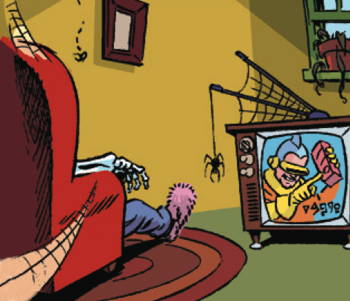January 2017
January 8, 2017
The Voice of Snow White
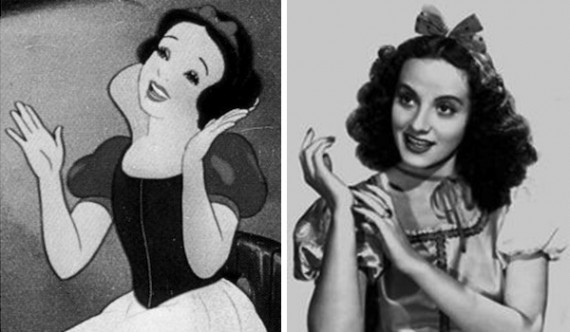
Snow White and Adriana Caselotti (source: The Disney Wiki)
I came across a story in a 1938 newspaper about how Adriana Caselotti got the job of being the voice of Snow White in Disney's 1937 movie:
Unfortunately for Caselotti, her dream of becoming a movie actress didn't turn out as she hoped. In fact, providing the voice for Snow White turned out to be the worst career move she could have possibly made as an aspiring actress — because Walt Disney, wanting to preserve the "illusion of Snow White," decided he couldn't have her voice be heard in any other context. So he prevented Caselotti from ever finding work as an actress again, except for minor appearances in The Wizard of Oz and It's a Wonderful Life.
As a consolation prize for having destroyed her career, the Disney company named her a "Disney Legend" in 1994.
From wikipedia:

Wilkes Barre Times Leader - Apr 8, 1938
Posted By: Alex - Sun Jan 08, 2017 -
Comments (1)
Category: Movies, Cartoons, Actors
Envy
Wikipedia page says:
Envy received generally negative reviews from critics. On Rotten Tomatoes the film has an approval rating of 8% based on 117 reviews with an average rating of 3.1/10. The site's critical consensus reads, "Jack Black and Ben Stiller fail to wring laughs from a script that's essentially one extended poop joke."[3] On Metacritic, the film has a score of 31 out of 100 based on 30 critics, indicating "generally unfavorable reviews".[4] Audiences polled by CinemaScore gave the film an average grade of "D" on an A+ to F scale.[5]
The film had been shot almost two years before its release, and was in danger of going straight-to-video in the US due to poor audience response during test screenings. It was only due to the success of 2003's School of Rock starring Jack Black that it finally got a theatrical release. Nevertheless, the film performed poorly in US theaters, so much so that it was released straight-to-video in several European countries and Australia.[6]
The film was nominated for a Razzie Award for Worst Actor (Stiller), but lost to Fahrenheit 9/11 (George W. Bush). At the 2004 Cannes Film Festival, during a press conference for Shark Tale (2004), both Black and DreamWorks' Jeffrey Katzenberg publicly apologized for Envy.[6]
Posted By: Paul - Sun Jan 08, 2017 -
Comments (0)
Category: Ineptness, Crudity, Talentlessness, Kitsch, and Bad Art, Movies, Scatology, Dogs, Twenty-first Century
January 7, 2017
Yuma Swastika Bridge
I spent New Year's Day in Yuma, Arizona, where I had a chance to see a local oddity — the Swastika Bridge, which can be found out in the desert just north of the city.According to local legend, the swastikas were carved into the bridge by German POWs held nearby during WWII. Another story has it that the bridge was designed by the Nazis and shipped to Arizona from Germany.
The reality is that the bridge was built in 1907 by the U.S. Reclamation Service. The engineers decorated it with swastikas after seeing similarly designed and decorated bridges during a trip to India.
The bridge was part of the larger effort to dam the Colorado River and create an agricultural oasis around Yuma.
More info at the Yuma Sun or smoter.com.
And you can find a lot of other examples of the pre-Nazi use of swastikas in American culture at the American Swastika blog.


Posted By: Alex - Sat Jan 07, 2017 -
Comments (3)
Category: Buildings and Other Structures, Evil, Signage, Arizona
Irv Pollock, Auto Dealer

According to this verbal portrait of the era,, the Toledo, Ohio, car-dealership scene of the 40s, 50s and 60s was a vibrant, competitive time. Certainly a dealer would want to come up with wild ads to stand out. Irv Pollock must have felt that way anyhow!
Note: you might have to scroll left or right at the links to see the original ad.
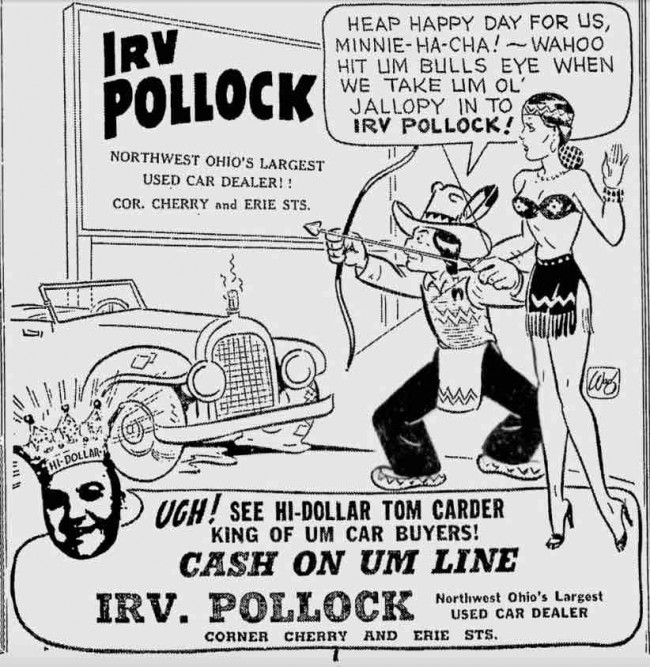
Original ad here.
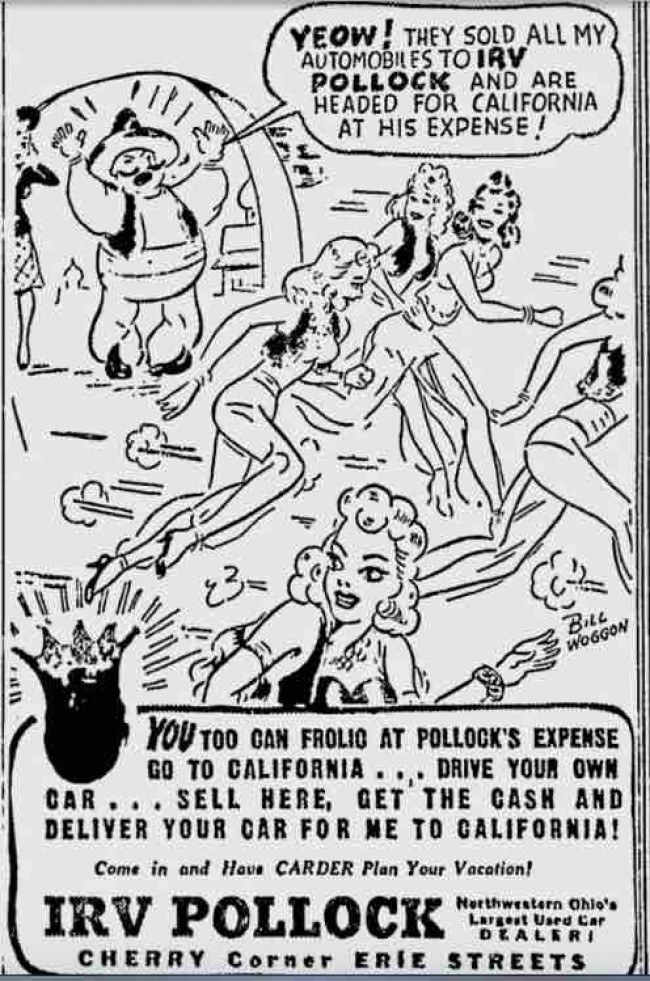
Original ad here.
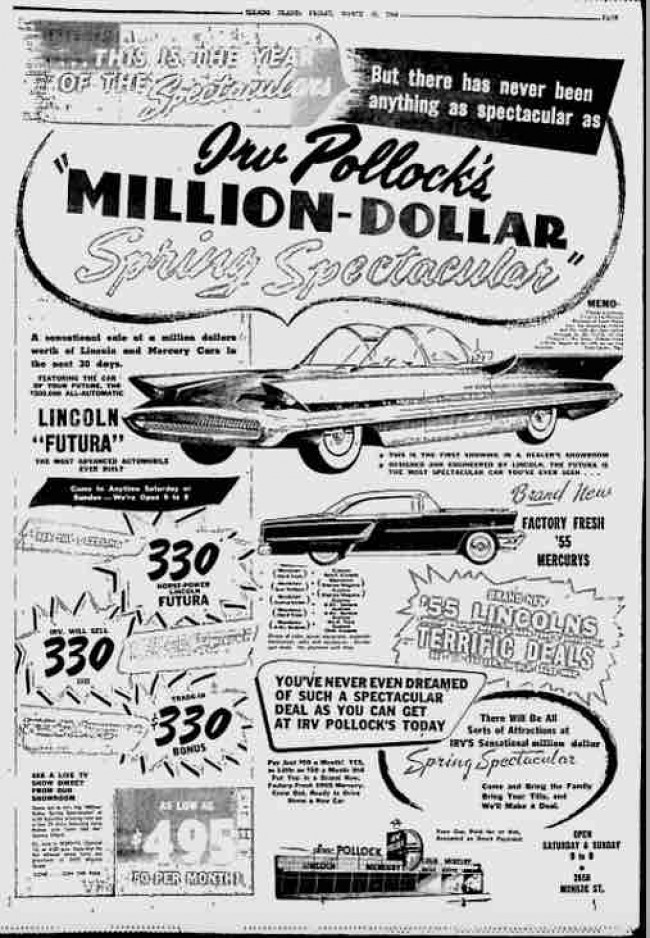
Original ad here.
Posted By: Paul - Sat Jan 07, 2017 -
Comments (3)
Category: Business, Advertising, Excess, Overkill, Hyperbole and Too Much Is Not Enough, Regionalism, 1940s, 1950s, Cars
January 6, 2017
Mousetrap Cigarette Lighter
Introduced at the 1941 meeting of the Inventors of America society in New York — a combined mousetrap and cigarette lighter.The caption on the first image is confusing. It says "a lever sets the mouse in motion," but I assume that's a mistake. It should probably read, "The mouse sets a lever in motion."
Another newspaper offered the following explanation of the device's operation: "When mouse springs trap, it sends pinball down ramp. Ball releases spring, and up pops an arm which strikes a match."
When the Inventors of America met again later that year in Los Angeles, one of their members showed off some mice-killing

The San Bernardino County Sun - July 25, 1941

The Pittsburgh Press - July 27, 1941
Posted By: Alex - Fri Jan 06, 2017 -
Comments (4)
Category: Inventions, 1940s
Bowling is for Bored Teens!
Posted By: Paul - Fri Jan 06, 2017 -
Comments (3)
Category: Business, Advertising, Sports, Teenagers, 1960s
January 5, 2017
Husband Wields Occult Powers
September 1909: Mrs. Christina Brown of Elgin, Illinois filed for divorce from her husband on the grounds that he was a wizard who wielded occult powers, compelling her to do things against her will, such as:- Sitting for hours in one chair while he controlled her thoughts as well as actions without touch or word.
- Revealing the choicest bits of neighborhood gossip, no matter how solemnly she had sworn to keep them a secret.
- Telling him what she really thought of him, despite her effort to pretend that he was the only man in the world.
- Admitting that she didn't believe his fish stories.
- Confessing that she had cooked up the oldest and poorest food in the house when he brought a friend home to dinner unexpectedly.
- Purchasing a hat and gown at the cheapest store in town when she had fully intended to buy them at a more expensive establishment.
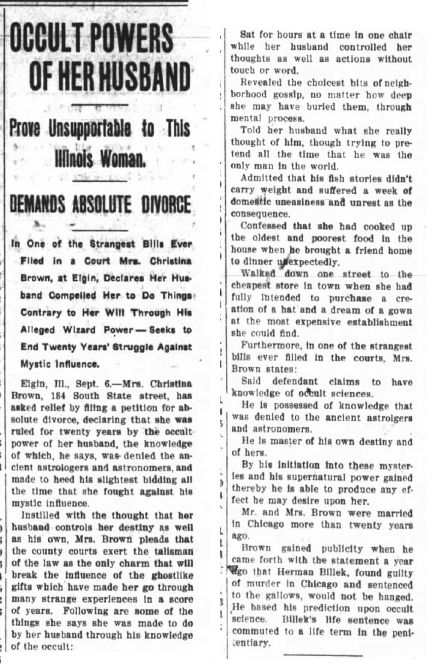
The Alexandria Times-Tribune - Sep 6, 1909
Posted By: Alex - Thu Jan 05, 2017 -
Comments (1)
Category: Divorce, 1900s
Yogi’s Space Race
Here in the fortieth anniversary year of Star Wars, let us pause to consider all the ways in which it elevated the genre of science fiction, inspiring such followers as Yogi's Space Race.
Wikipedia page here.
Posted By: Paul - Thu Jan 05, 2017 -
Comments (2)
Category: Aliens, Anthropomorphism, Ineptness, Crudity, Talentlessness, Kitsch, and Bad Art, Homages, Pastiches, Tributes and Borrowings, Cartoons, 1970s
January 4, 2017
Cinderella’s Bad Influence
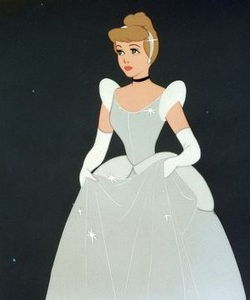
In the 1950s, Dr. John Kershaw, an English medical officer, argued that, "The expectation of meeting a dream lover and automatically living 'happily ever after' keeps children from being taught 'to realize the difficulties and responsibilities of marriage.'"
More recently, Cinderella has been attacked for the "princess culture" that it cultivates. From the Sentinel & Enterprise (3/22/2012):
"Cinderella is remarkably passive throughout the entire movie," Moser said, adding that Prince Charming didn't take much of his life into his own hands either and relied greatly on his father.
Rather than make her own dreams come true, he said, Cinderella waits for others, such as her fairy godmother, to do the work for her, and trusts that things will turn out right.
The message it sends is that it is best to buy into the status quo and that one's dreams can be achieved by following the rules set by previous generations, Moser said.
NY Times critic Peggy Orenstein has even written a bestselling book on this subject, Cinderella Ate My Daughter (2011).
To the best of my knowledge, I've never seen Cinderella. Perhaps I should consider myself lucky for having escaped its poisonous influence.
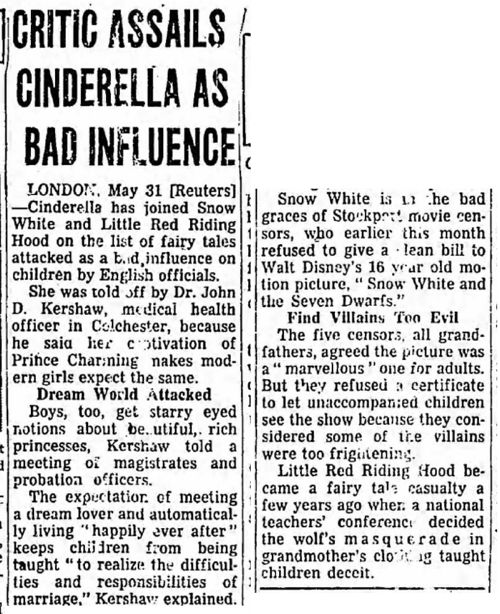
Chicago Daily Tribune - June 1, 1954
Posted By: Alex - Wed Jan 04, 2017 -
Comments (4)
Category: Movies, Myths and Fairytales, 1950s
Mystery Illustration 36
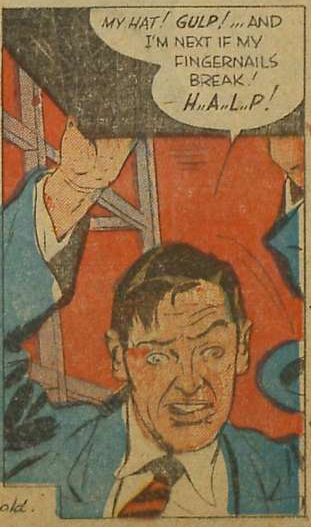
You guys did pretty good guessing Danny Kaye some time ago. So who is this world-famous comedian?
The answer is here.
And after the jump.
More in extended >>
Posted By: Paul - Wed Jan 04, 2017 -
Comments (2)
Category: 1950s, Comedians
| Get WU Posts by Email | |
|---|---|

| Who We Are |
|---|
| Alex Boese Alex is the creator and curator of the Museum of Hoaxes. He's also the author of various weird, non-fiction books such as Elephants on Acid. Paul Di Filippo Paul has been paid to put weird ideas into fictional form for over thirty years, in his career as a noted science fiction writer. He has recently begun blogging on many curious topics with three fellow writers at The Inferior 4+1. Chuck Shepherd Chuck is the purveyor of News of the Weird, the syndicated column which for decades has set the gold-standard for reporting on oddities and the bizarre. Our banner was drawn by the legendary underground cartoonist Rick Altergott. Contact Us |
